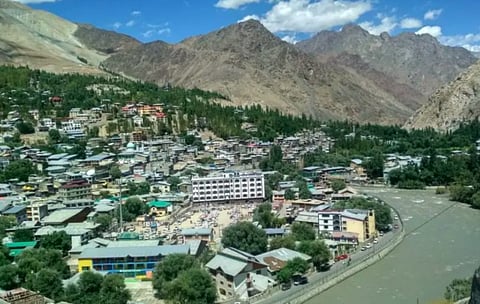

Srinagar: Two years after Ladakh was carved as a Union territory with the abrogation of Article 370 and 35A, the administration will be issuing residence certificates to permanent residents of the region, particularly for the purpose of reserving their rights over jobs.
The rules apply to both Leh and Kargil divisions where local bodies, civil rights groups, religious and political bodies had been demanding safeguards against theCentral government's August 5, 2019 decision that had revoked exclusive rights of locals over land, jobs and other provisions.
According to an administrative order dated September 4, 2021, "any person who possesses a Permanent Resident Certificate (PRC) issued by the competent authority in the districts of Leh and Kargil or belongs to a category of persons who would have been eligible to be issued PRC shall be eligible to receive the 'Resident Certificate'."
The order has been issued "to temporarily define 'Resident of Union Territory of Ladakh' for the purpose of appointment to all the non-gazetted posts borne on the establishment of any department or service of administration of Ladakh." Many including representatives from Ladakh Autonomous Hill Development Council (LAHDC) have welcomed the move.
As per the order, children of persons possessing a 'Permanent Resident Certificate' (PRC) or children of persons who belonged to a category of persons who would have been eligible to be issued a PRC by the competent authority in the districts of Leh and Kargil will also be eligible to receive the Resident Certificate.
The administration has also enhanced the upper age limit for entry into government services in all posts. The upper age limit has been increased for general category students from 40 years to 42 years, from 43 years to 45 years for reserved category candidates, and for physically challenged candidates, from 42 years to 44 years.
"The age relaxation would be a one-time exception and this relaxation shall remain in force for two years," the order read.
The decision, however, comes in contrast to the domicile laws notified for Jammu and Kashmir Union territory where a domicile – including those from outside the region – can apply for government jobs, something that was not possible earlier. The decision was opposed by civil rights groups and political parties, including the mainstream National Conference (NC) and People's Democratic Party (PDP) who considered the move as "undemocratic and arbitrary".
The regional political parties, who have formed a group called the People's Alliance for Gupkar Declaration (PAGD), also opposed the J&K domicile rules due to their stand against the abrogation of Article 370 and 35A. The parties, including PDP and Communist party of India (Marxist), both constituents of PAGD, termed it as a means to disempower Kashmiris.
In Ladakh and Kargil, an Apex Body of People's Movement was formed in September 2020 that demanded constitutional safeguards to protect identity, land, demography and natural environment of the region.
The fresh order comes as a respite for more than 2,50,000 people of Ladakh, a region with a distinct heritage and fragile ecology.
Meanwhile, in a separate order on Monday, the Ladakh administration has notified the 'Schedule Tribe' certificate to be considered as valid proof of domicile for the Prime Minister's Special Scholarship Scheme for the Academic Session 2021-22.
"The candidates applying for registration for PMSSS 2021-22 can upload the ST certificate in place of Domicile Certificate specified in the guidelines of PMSSS 2021-22," an official said.
First published by Newsclick.